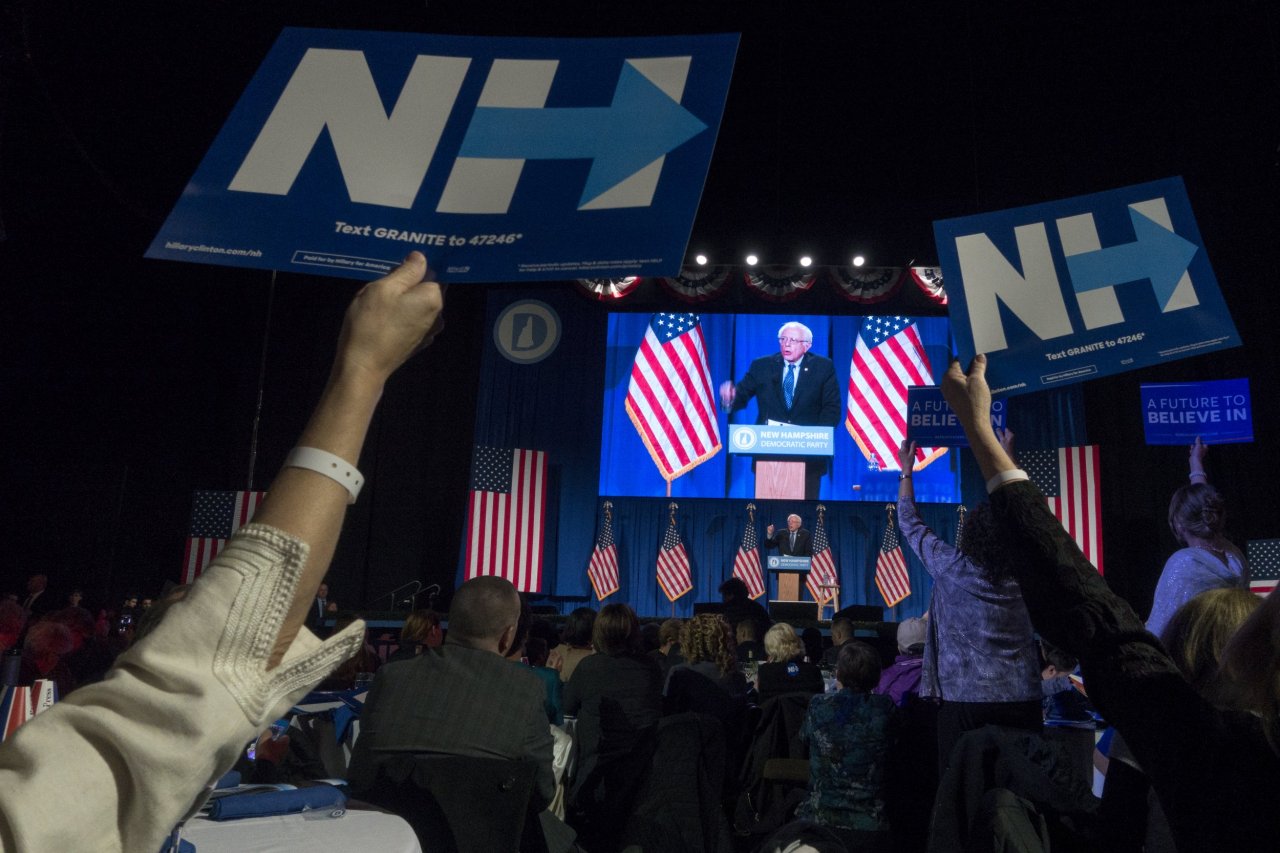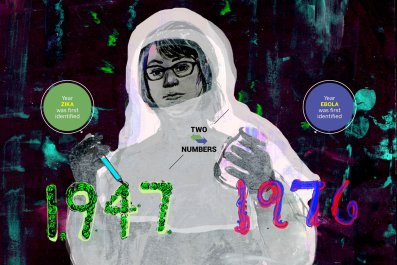The financial system was in a meltdown, and Bernie Sanders was on the Senate floor inveighing against the financial bailout known as the Troubled Asset Relief Program, or TARP, in October 2008. "The masters of the universe, those brilliant Wall Street insiders who have made more money than the average American can even dream of, have brought our financial system to the brink of collapse," Sanders railed in his now-familiar Brooklyn accent, in which jobs becomes jawbs and dollars sounds like dah-llahs.
Now "these multimillion-ahhs," he continued, "are demanding that the middle class...pick up the pieces that they broke!"
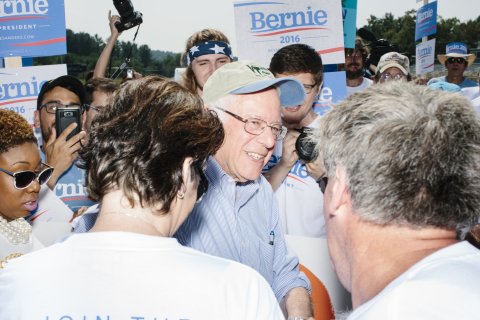
As Sanders spoke, a young aide behind him propped up posters featuring sinister-looking close-ups of select fat cats. Treasury Secretary Henry Paulson ("Goldman Sachs rewarded him with a $35 million bonus in 2005," the caption read) and Richard Fuld, the former CEO of Lehman Brothers ("$354 million in total compensation over the past five years") were just two of those singled out.
Sanders's colleague, Hillary Clinton, came to the floor the same day, more somber than the Vermonter, less theatrical and brandishing no posters. "The costs of inaction are far too great," the New York Democrat said in defense of TARP, explaining more than blaming. "Essentially, what we are doing here, in an intangible way, is restoring trust and confidence and, in a very tangible way, helping to restore credit."
It's easy to paint Sanders, a political independent, as the raging liberal, the idealist, the anti–Wall Street crusader, and Clinton as the pragmatist, the centrist, the friend of financiers. But an in-depth examination of Clinton's eight-year career in the Senate and Sanders's 23 years in the Senate and House reveals those portrayals are caricature, based on truth but exaggerated. The two Democratic presidential contenders were certainly at odds stylistically. But on Capitol Hill, Clinton and Sanders were not as different as they might appear.
It's in the interest of each campaign to emphasize their disagreements. Clinton has used Sanders's reputation as a starry-eyed idealist to play up her own self-styled image as a "doer." Pressed at the first Democratic debate, in Las Vegas, on whether she is really a progressive or more of a moderate, Clinton responded with a none-too-subtle diss: "I'm a progressive. But I'm a progressive who likes to get things done."
Their differences on key votes have already become campaign fodder. Clinton has tried to make the case that Sanders isn't the consistent liberal he's playing in the primary, highlighting his vote against a 2006 immigration reform bill that Latino groups favored and Clinton supported. In 1993, it was the Vermont "socialist" who voted against the Brady Act mandating a five-day waiting period for handgun purchases to enable background checks. Clinton wasn't in Congress at the time, but her husband, President Bill Clinton, signed the bill into law.
Sanders counters by noting that Clinton voted to authorize the Iraq War in 2002; he opposed it. And, of course, Clinton voted for the TARP bailout Sanders opposed. Sanders also likes to point out that while he's never been much of a fundraiser, Senator Clinton hauled in millions of dollars through her campaigns and political committee, Hill PAC, including vast amounts from Wall Street.
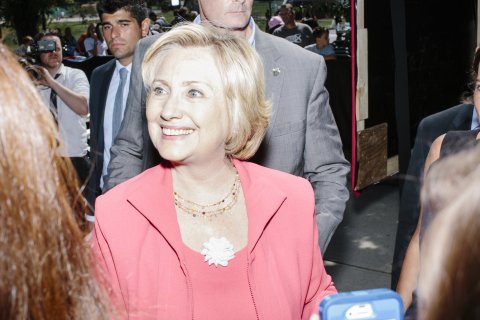
And for Sanders, playing the role of the principled insurgent has allowed him to tap into the nation's populist, anti-Washington mood. At his campaign launch in Burlington, Vermont, in May, the 74-year-old promised "a political revolution to transform our country." In a November interview with the Boston Globe editorial board, he asserted, "I disagree with Hillary Clinton on virtually everything."
Really? During the two years they overlapped in the Senate, Sanders co-sponsored 19 pieces of legislation that Clinton introduced, while Clinton signed on in support of seven Sanders bills. Vote studies from Congressional Quarterly find that Clinton voted with the Senate Democratic leadership 99 percent of the time in 2008 and 98 percent in 2007. For Sanders, the rate was 98 and 97 percent, respectively, during those two years. Not a lot of daylight.
As members of Congress, Clinton and Sanders achieved narrow, incremental policy advances. That's partly due to political reality. Democrats—Clinton's party and the one an independent Sanders aligned with—were out of power in Washington for the majority of their tenures. But both lawmakers also made choices that kept them from being major power brokers. A lightning rod when she came to Washington, Clinton had strategic reasons for keeping a low profile and playing the part of the studious junior senator. And Sanders set himself apart as a political independent, which limited his influence, particularly in the House, where he refused to caucus with Democrats.
Nevertheless, both Sanders and Clinton proved capable of building coalitions to advance their agendas. And though Sanders in particular wasn't shy about mounting his soapbox, he ultimately took the same approach as Clinton—working within the system to shape the congressional sausage-making rather than trying to shut down the whole place, à la Texas Senator Ted Cruz. In other words, when it comes to big policy changes, neither is nearly as reckless or naïve as their critics would have you believe.
As the junior senator from New York, Clinton largely avoided the headlines, a strategy that helped her put to rest any suspicions of her being a carpetbagger. Miraculously, it also won over her new colleagues, even some of Congress's most vitriolic Clinton-bashers.
Instead of trying to insert herself into national debates such as the "war on terror" or the Bush tax cuts, Clinton zeroed in on issues affecting families and children from her perch on the Senate Health, Education, Labor and Pensions Committee. She built a reputation as a hawk on the Armed Services Committee. And she devoted herself to being an active advocate for the Empire State, supporting upstate farming, fighting local military base closures, advocating for rural broadband access and other parochial issues more likely to make the front pages of the Syracuse Post-Standard than The New York Times.
"She was a workhorse, but she was also building this electoral base for her political future," notes political scientist Sarah Binder, an expert on Congress at the Brookings Institution.
Clinton's crowning achievement in the Senate was securing support for New York's rescue workers and downtown businesses after the September 11 attacks. She and New York's senior senator, Chuck Schumer, obtained $20 billion to rebuild parts of lower Manhattan decimated by the attacks, for example. Even as the World Trade Center was still smoldering, she hustled to make sure rescue workers' benefits wouldn't be caught in the usual red tape.
"Within days, she was on [the] Justice [Department], getting the delegation to do letters...to get it speeded up," says a former aide to a New York member of Congress, who would speak only on background about the internal workings of New York's congressional delegation. Of the post–September 11 response, that was "the thing that I most remember being explicitly her idea," says the ex-aide. "Turns out, it's really helpful to have someone who knows what goes on in an administration."
Sanders didn't come to Washington with anywhere near the list of contacts Clinton had, and unlike her, he wasn't interested in playing nice with colleagues on either side of the aisle. Instead, the self-described "democratic socialist" quickly earned a reputation as a combative advocate for liberal principles.
Among other things, he kept up an episodic sparring match with longtime Federal Reserve Chairman Alan Greenspan. Ten years to the day before Sanders went to the Senate floor to blast the Wall Street bailout, he used remarkably similar language to lambaste Greenspan at a 1998 House banking committee hearing. "There is [sic] growing doubts about the sensibility of the Thatcher-Reagan, if I might add, Greenspan, approach to economic development, an approach which says it is OK for a couple of hundred billionaires throughout the world to own more wealth than the bottom 45 percent of the world's population," a more youthful, though still white-haired, Sanders told Greenspan tartly. The C-SPAN cameras managed to catch the Fed chairman's slightly bemused expression as he absorbed the Sanders harangue, a look that seemed to say, "Here we go again."

Former Hill staffers and colleagues say Sanders's rigid principles and prickly personality often worked against him, alienating even potential allies. Representative Jerry Nadler of New York, who shares many of Sanders's liberal views, recalls his Vermont colleague grousing to him about the House Democrats' direction when the two were in Congress together in the 1990s. "And I'd look at him and say, 'It's your fault...because you don't join the Democratic caucus and raise your voice in the caucus.'"
But Huck Gutman, Sanders's longtime friend and onetime chief of staff, says Sanders learned pretty quickly that "he couldn't just be an iconoclastic, stand-alone member of the House and get anything done." In 1991, Sanders helped found the Congressional Progressive Caucus, which has grown to become one of the largest caucuses in Congress. Under Sanders's early leadership, however, it had limited impact in a Democratic Party dominated by Bill Clinton and his centrist strategy of "triangulation," where he separated himself from both hard-line liberals and conservatives. Sanders also formed an unlikely partnership with iconic libertarian Representative Ron Paul of Texas on proposals to lower prescription drug prices (which stalled) and an amendment to exempt library and bookstore records from intelligence surveillance under the Patriot Act (which passed the House but was blocked in the Senate).
With little party clout, introducing amendments to his colleagues' bills was Sanders's main avenue for shaping policy in the House. Compared with his revolutionary rhetoric, the process of adding and subtracting lines from legislation is an object lesson in incrementalism. Yet it also demonstrated that Sanders could play the legislative game. His congressional office boasted in 2005 that he had passed more amendments in the House than any other member over the previous decade. Getting them past a Republican Senate and White House, of course, was another matter.
Clinton too was intent on playing the game, but her strategy was entirely different from Sanders's. Her "all politics is local" approach followed a model established by other popular pols—a 2007 New York magazine profile labeled her "Senator Hillary Pothole," a riff on the nickname for another New York senator with a penchant for local projects, Al D'Amato. Even notoriously jaded New Yorkers were charmed. "I've been at this a long time and dealt with a lot of elected officials at every level, and I can honestly say that Senator Clinton was probably the most accommodating that I ever had to associate with," says Michael McManus, the longtime president of the New York State Professional Fire Fighters Association. "When she was here, if we had a situation that needed her attention, she was always available."
There's one New York constituency, however, that has been an Achilles' heel for Clinton in the 2016 primary race. Clinton, Sanders regularly points out, has received millions of dollars in campaign cash and speaking fees from Wall Street. "I don't get personal speaking fees from Goldman Sachs," Sanders sniffed during the Democrats' January 17 debate in South Carolina. Clinton's defense, in part: representing Wall Street was part of her job as New York senator.
Indeed, Clinton wouldn't have been doing her job if she hadn't had some relationship with Wall Street while in the Senate. As William Mellin, president of the New York Credit Union Association, points out, "The financial sector of New York is so incredibly important to the finances of New York state," both in terms of tax revenue and employment. "Even credit unions, we don't say that those big banks are evil." Or, as one former Senate aide put it, Wall Street to New York is " like pigs to Iowa."
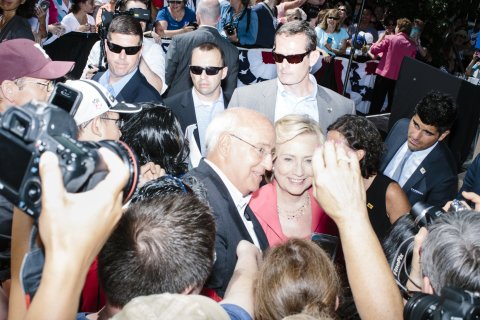
Nadler, a liberal Democrat whose House district includes the New York Stock Exchange, cautions that you can't draw a direct line between campaign cash and policy outcomes. "It's somewhat indicative, but it's never dispositive to look at someone and say they've taken these kinds of campaign contributions," Nadler insists. "I think you have to watch what she does." And according to interviews and an extensive review of records, it's clear Clinton wasn't a leading financial policymaker in the Senate, either pushing Wall Street's interests or trying to rein them in.
Clinton did step up her engagement as the mortgage crisis unfolded in 2007 (and she launched her first run for president). In 2007 and 2008, she introduced several bills to help struggling homeowners, as well as legislation to increase oversight of executive compensation. None of them moved forward in the Senate. Retired Senator Chris Dodd of Connecticut notes that Clinton also co-sponsored early versions of the credit card reform bill he shepherded in 2009, which "were violently opposed by the banks."
"If she was from Oklahoma or Missouri, I would say that was easy enough," Dodd says. "For the senator from Vermont to talk about it? Eh, that's all right." But for Clinton, that meant "taking on your own constituency." It's certainly true that Clinton could have done more to take on that constituency earlier, before the financial crisis started to erupt, but the same could be said of virtually everyone else in Congress, including Bernie Sanders.

Though Sanders has recently been grabbing headlines by howling about Wall Street's excesses, the nuts and bolts of financial policy were not a top priority. In the House, he voted against efforts to deregulate Wall Street, including the 1999 Gramm-Leach-Bliley Act that some blame for fomenting the financial crisis. However, as financial practices grew more and more risky over the past decade, the focus of Sanders's legislation, floor speeches and public remarks was issues like prescription drug prices, protecting Social Security and other worker benefits, and defending civil liberties in a post-9/11 world.
As for Sanders's time on the House Financial Services Committee, his Democratic colleague Greg Meeks recalls, "When you talk about making sure Main Street got a little bit of something in [banking legislation], he was one of the prime advocates." Sanders did introduce a 2005 bill to restrict credit card interest rate increases, but he didn't offer up any policy that would have curbed the risky bets Wall Street was making back then.
Sanders scored a couple of victories in the aftermath of the financial crisis, attaching an amendment to the 2009 stimulus bill barring bailed-out banks from hiring foreign workers for two years. And the 2010 Wall Street reform bill known as Dodd-Frank included his amendment requiring an audit of the Federal Reserve's $1 trillion-plus in emergency loans doled out in 2008. (Tellingly, Sanders compromised to get the Obama administration on board with that measure, prompting Representative Paul to claim the Vermont senator "sold out.")
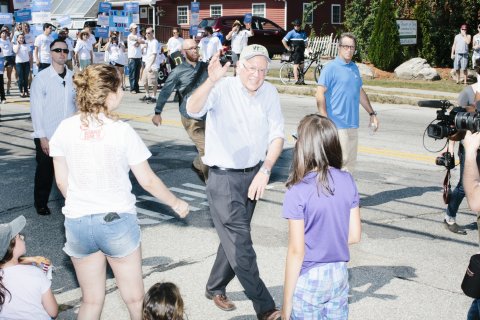
But Dodd, the banking committee's chairman from 2007 to 2001, says he doesn't recall interacting with Sanders much on financial policy. "I wouldn't use that as some sort of indicator of a lack of interest," Dodd says. But if Vermont's junior senator had had a tremendous interest in the issues, "that would have been evident from a higher level of engagement and being on the committee." After all, when it comes to making Wall Street policy, the committee is "where the action went on," Dodd says.
Warren Gunnels, a senior policy adviser for Sanders in the Senate, disagrees. "The great thing about the Senate...is you don't have to serve on a particular committee in the Senate to have influence over those types of issues." And Gutman, a professor at the University of Vermont, says his former boss was able to help average Americans with Senate committee assignments focused on the budget, health and energy. The one committee Sanders asked to be on, Gutman says, was Veterans' Affairs, an issue to which he's long been committed. That's also where he notched his biggest policy accomplishment in a quarter-century congressional career.
The Department of Veterans Affairs has become notorious for the delays and backlogs in its veterans' care, but when news broke in the spring of 2014 that more than 40 veterans died waiting for services at a Phoenix VA facility, an open secret became a media firestorm. Coming just months before midterm elections, it put the Obama administration and Democrats, who still controlled the Senate, on the defensive. And it thrust Sanders, just a year into his chairmanship of the Veteran Affairs' Committee, into the middle of the debate over how to fix the mess.
Sanders ended up working with veteran GOP Senator John McCain to craft a bipartisan proposal to increase VA funding and improve responsiveness, which passed the chamber. Sanders then had to hash out differences with his Republican counterpart in the House, conservative Representative Jeff Miller of Florida. "I must say, it was a very colorful and expletive-filled experience," McCain told reporters with a wry laugh at a December breakfast in Washington. Sanders similarly recalled "many shouting matches and walkouts" during the negotiations. But after a series of stops and starts, Congress sent a compromise bill expanding and improving veterans' health care (though not by nearly as much as Sanders and some veterans' groups wanted) to the president's desk.
Clinton makes much of her ability to build consensus, but she lacks a similar marquee piece of legislation from her (admittedly shorter) time in the Senate. With a few exceptions (her Iraq War vote, first and foremost), it's hard to find examples where she stuck her neck out. Sure, she backed the 2006 immigration reform proposal, but she wasn't a central force hashing out that bill or other major legislative deals. In the long term, that may have been wise. One need only watch Republican presidential aspirant Marco Rubio twist and squirm as he tries to shed the political baggage from being part of the Senate "Gang of 8" that pushed through an immigration reform bill in 2013 that included amnesty, a word that haunts his campaign when it comes to the virulently anti-immigration crowd.
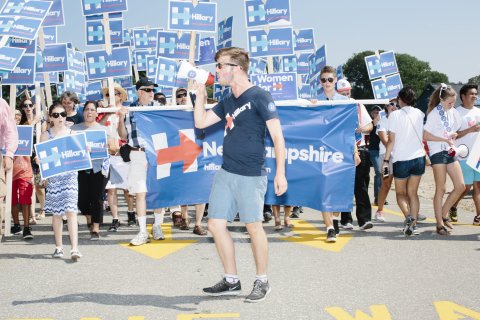
Jim Manley, a former senior aide to Senate Minority Leader Harry Reid and Ted Kennedy, the Senate's "liberal lion," before that, agrees that Clinton was "cautious" as a lawmaker but considers that "a smart move." Her "no drama" approach became a model for other high-profile freshman senators who came to Washington on Clinton's heels, big names like Saturday Night Live alum Al Franken and a silver-tongued young Illinois legislator, Barack Obama. More recently, however, that approach has fallen out of favor.
While Clinton aimed to blend in, today's Senate rookies—like Texas Republican Ted Cruz, Massachusetts Democrat Elizabeth Warren and Arkansas Republican Tom Cotton—have come to the Senate determined to break things. Their combative approach is more in tune with today's partisan politics than the "go along to get along" tack, and her campaign is tentatively trying to inject a little "firebrand" into the brand.
Sanders, by contrast, was pulling in adoring fans by the thousands at his stops in Des Moines, Iowa, and Manchester, New Hampshire. But he has always been a virtual nobody on Capitol Hill. Late this past fall, he was drawing record crowds to rallies outside Washington, but I was the only reporter who sought out the Democratic presidential contender one day as he shuffled from the Senate floor to the underground tram back to the Dirksen Senate Office Building.
There was one sign, however, that Sanders's unlikely 2016 insurgency has changed his status in Washington. After discussing VA reform, I watched from the tram as Sanders and his small entourage of staffers disembarked and headed for the escalator to his office. They were intercepted by a young woman, bashful but enthusiastic. "Intern," I heard her say to the septuagenarian senator as the train doors began to close. I also caught "thank you sooooo much" and "true inspiration."
I couldn't hear everything she said, but I'm confident she wasn't gushing about his legislative compromise on the VA bill.



